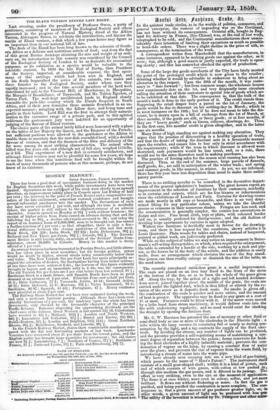Some of the large dry goods merchants of the City
have lately mooted the point of the prolonged credit which is now given to the retailer ; debating whether it would be advisable to endeavour to bring about an alteration in this respect. Upon the 20th of the month, it was custo- mary to "date fOrward ' ; but from common usage, the wholesale houses now unanimously date on the 1st, and very frequently issue circulars calling the attention of their customers to special lots of goods which are to be exhibited at that date. The consequence is, that the bulk of the month's trade is done in the early portion of it. The credit stands thus. Supposing the retail draper buys a parcel on the 1st of January, the goods would be due to discount on his settling-day in March • which is in most instances on the 10th ; but if he does not mean to take the dis- count, he is drawn upon in a bill of exchange from the let of March, at three months, if the goods are silk, or fancy goods ; or at four months, if they are "heavy goods," such as linens, calicoes, sheetings, &c. Thus, in the first case five months' credit is given altogether, and in the latter case six menthe:.
Many firms of high standing are against making any alteration. They argue that the practice of discounting is a healthy operation of trade, and that the desire of taking the discount acts in a favourable manner upon the retailer, and causes him to buy only in strict accordance with his requirements ; while if the term in which discount is allowed were shortened, cash payments would be less usual, and, as a rule, there would not be the same discretion used in making purchases.
The practice of forcing sales for the season next ensuing has also been discussed. Thus, at the end of the summer, largo parcels of flannels, stuff goods, &e. are sold in anticipation of the winter trade ; and spring and summer goods, in like manner, in winter. As yet, we are informed, there has this year been less disposition than usual to make these antici- patory parcels.






























 Previous page
Previous page